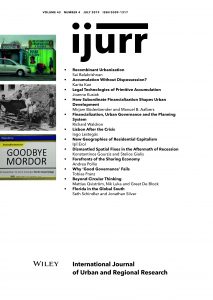The urbanization of rural China is increasingly achieved not through physical land grabs but the strategic enrolment of rural communities in the commodification of land via speculative rentiership. This article critically examines this shift in approach from the deployment of extra‐economic force in state‐led land expropriations toward an increasing reliance on market mechanisms in land development. A case study, the construction of a financial district in peri‐urban Guangzhou, shows that the enrolment of village communities is achieved through their cooptation as corporatist market players in regimes of rent‐based accumulation. While the apparent use of voluntaristic market exchange has reduced the need for coercion, however, the commodification process has at the same time created new terrain for dispossessory practices whereby value is illicitly extracted and seized by elites through rent relations. The shift from overt land grabbing to more covert mechanisms of value appropriation has important implications for rural class relations and contentious politics.

